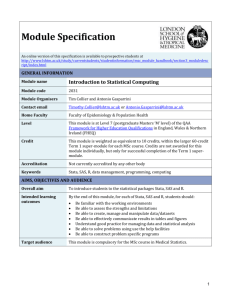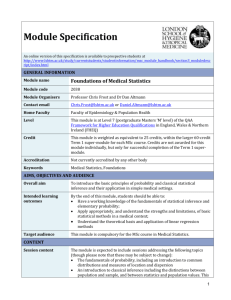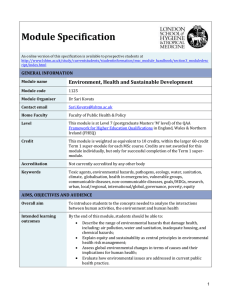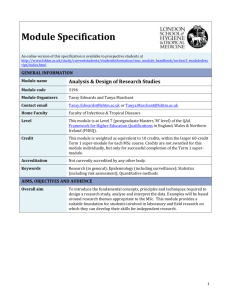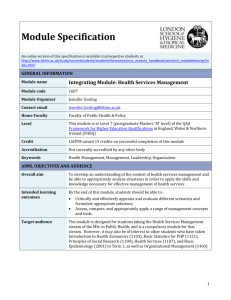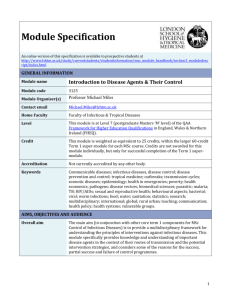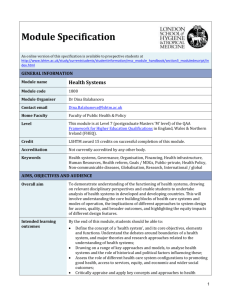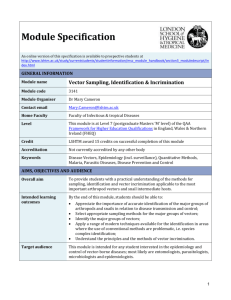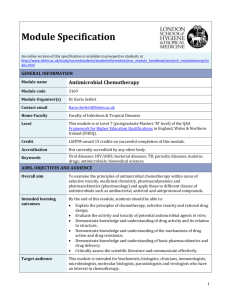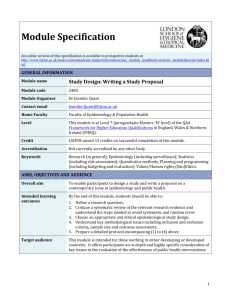1121 Basic Statistics for Public Health & Policy Module Specification
advertisement
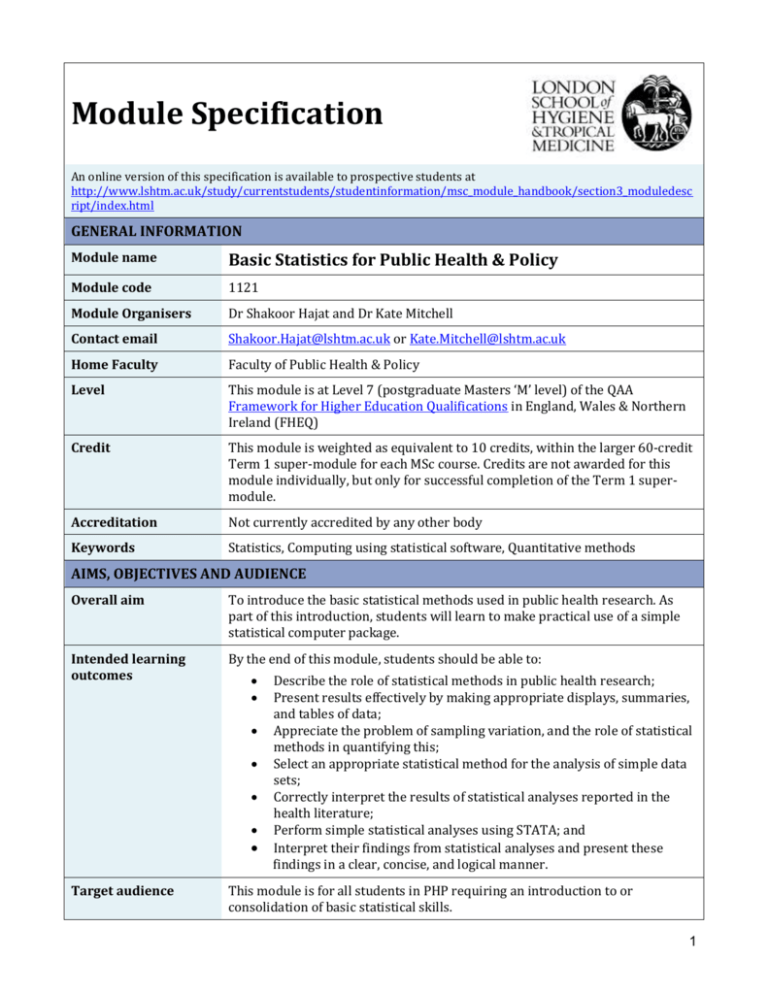
Module Specification An online version of this specification is available to prospective students at http://www.lshtm.ac.uk/study/currentstudents/studentinformation/msc_module_handbook/section3_moduledesc ript/index.html GENERAL INFORMATION Module name Basic Statistics for Public Health & Policy Module code 1121 Module Organisers Dr Shakoor Hajat and Dr Kate Mitchell Contact email Shakoor.Hajat@lshtm.ac.uk or Kate.Mitchell@lshtm.ac.uk Home Faculty Faculty of Public Health & Policy Level This module is at Level 7 (postgraduate Masters ‘M’ level) of the QAA Framework for Higher Education Qualifications in England, Wales & Northern Ireland (FHEQ) Credit This module is weighted as equivalent to 10 credits, within the larger 60-credit Term 1 super-module for each MSc course. Credits are not awarded for this module individually, but only for successful completion of the Term 1 supermodule. Accreditation Not currently accredited by any other body Keywords Statistics, Computing using statistical software, Quantitative methods AIMS, OBJECTIVES AND AUDIENCE Overall aim To introduce the basic statistical methods used in public health research. As part of this introduction, students will learn to make practical use of a simple statistical computer package. Intended learning outcomes By the end of this module, students should be able to: Target audience Describe the role of statistical methods in public health research; Present results effectively by making appropriate displays, summaries, and tables of data; Appreciate the problem of sampling variation, and the role of statistical methods in quantifying this; Select an appropriate statistical method for the analysis of simple data sets; Correctly interpret the results of statistical analyses reported in the health literature; Perform simple statistical analyses using STATA; and Interpret their findings from statistical analyses and present these findings in a clear, concise, and logical manner. This module is for all students in PHP requiring an introduction to or consolidation of basic statistical skills. 1 CONTENT Session content The module is expected to include sessions addressing the following topics (though please note that these may be subject to change): Describing data: tables and graphs; proportions; measures of central tendency (mean, median), and spread (range, standard deviation); differences and ratios. Sampling variability: confidence intervals and p-values, especially for means and proportions, and for differences in means and proportions. Simple linear regression analysis and correlation coefficients and an introduction to multivariable analysis. Statistical analyses by computer (using STATA). TEACHING, LEARNING AND ASSESSMENT Study resources provided or required Module reader provided, including statistical tables, formula sheet and STATA reference mini-manual. A calculator will be needed – details of the model recommended and basic instructions for its use will be provided in the reader. Textbooks will also be recommended. Teaching and learning methods Lectures will introduce topics, but students are likely to learn most by working through carefully constructed exercises as private study and in the practical sessions, and by discussion in the practical sessions. Some exercises will require using the STATA computer package, and some practical sessions will therefore be in the computer laboratories, which are also open to students at other times. Assessment details Students undertake a data analysis exercise during the second half of the term and a progress test at the end of the term, neither of which will count towards the final MSc marks. Formal assessment is by written examination in June. For students who are required to re-sit, or granted a deferral or new attempt, the task will be a re-sit of the Paper 1 exam. Assessment dates The end of term progress test will take place in the final week of term 1, and the data analysis exercise is handed-in at the beginning of term 2. For students who are required to re-sit, or granted a deferral or new attempt at the written examination, the next examination date will normally be the following May/June. Language of study and assessment English (please see ‘English language requirements’ below regarding the standard required for entry). TIMING AND MODE OF STUDY Duration The module runs for 10 weeks at 0.5 days per week; this module runs on Monday mornings. Dates For 2015-16 the module will start on Monday 5 October 2015 and finish on Monday 14 December 2015. Timetable slot The module runs in LSHTM timetable slot Term 1 2 Mode of Study The module is taught face-to-face in London. Both full-time and part-time students follow the same schedule. Learning time The notional learning time for the module totals 100 hours, consisting of: Contact time ≈ 40 hours Directed self-study ≈ 10 hours Self-directed learning ≈ 10 hours Assessment, review and revision ≈ 40 hours APPLICATION, ADMISSION AND FEES Pre-requisites This module does not assume any previous knowledge of statistics, although students who have some such knowledge will be aided by it. English language requirements A strong command of the English language is necessary to benefit from studying the module. Applicants whose first language is not English or whose prior university studies have not been conducted wholly in English must fulfil LSHTM’s English language requirements, with an acceptable score in an approved test taken in the two years prior to entry. Applicants may be asked to take a test even if the standard conditions have been met. Student numbers Student numbers are typically [200+] per year; numbers may be capped due to limitations in facilities or staffing. Student selection Preference will be given to LSHTM MSc students, particularly those registered for the courses Public Health (all streams), Control of Infectious Diseases, and Public Health for Eye Care, and LSHTM research degree students. Other applicants meeting the entry criteria will usually be offered a place in the order applications are received, until any cap on numbers is reached. Applicants may be placed on a waiting list and given priority the next time the module is run. Full Registration (full participation) by LSHTM research degree students is required for this module, although the assessment for research degrees students is optional. Fees For registered LSHTM MSc students, fees for the module are included within MSc fees (given on individual course prospectus pages). If registering specifically for this module, as a stand-alone short course, individual module fees will apply. Tuition fees must be paid in full before commencing the module, or by any fee deadline set by the Registry. Scholarships Scholarships are not available for individual modules. Some potential sources of funding are detailed on the LSHTM website. 3 Admission deadlines For 2015-16: For registered LSHTM MSc students, the module choice deadline is the end of Term 1 Orientation Week (for Term 1 modules), Friday 2 October 2015. If registering specifically for this module, applications may be made at any time. The School gives priority to the needs of students registering for Masters and Research Degrees, and so places on any module may be limited - early application is therefore advised. Formal registration will take place on the morning of the first day of the module. ABOUT THIS DOCUMENT This module specification applies for the academic year 2015-16 Last revised 1 August 2014 by Shakoor Hajat Minor amendments SDB 24th July 15 London School of Hygiene & Tropical Medicine, Keppel St., London WC1E 7HT. www.lshtm.ac.uk 4
